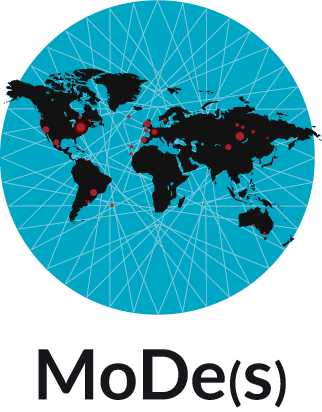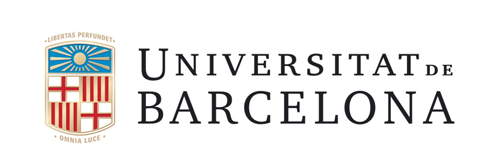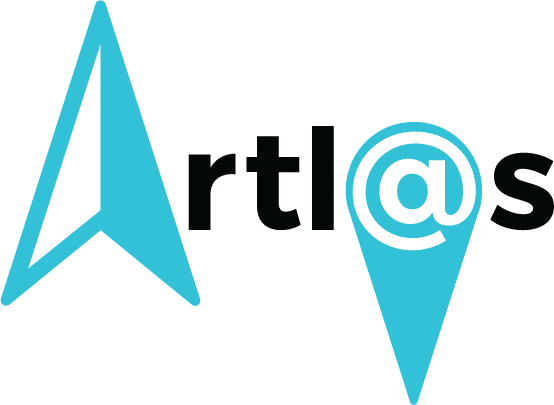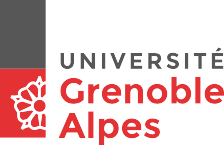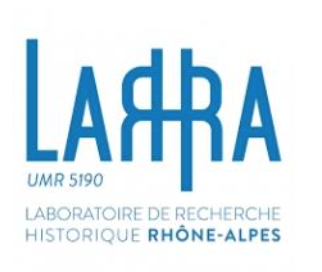From Geopolitics to Geoaesthetics.
The Challenges of the Spatial Turn, or Debates for a Transnational Art History
Monday, 9 November 2020, 10.00 – 16.00
Webinar – University of Geneva
This doctoral workshop, part of the MoDe(s) doctoral program and organized in collaboration with the Artl@s Project and the Chair for Digital Humanities at the University Geneva (UNIGE), proposes to share and discuss a series of methodological and theoretical resources in relation to the study of cultural and intellectual practices from the Cold War to contemporaneity and their intersections with the sociopolitical contexts from a transnational and geohistorical perspective. The proposals opened to debate within this seminar are situated within the field of art history; however, they are open to contributions from other disciplines such as cultural and visual studies, aesthetics, contemporary history, political sciences, and in this case specifically geography and cartographic approaches.
While the work on case studies represents an essential part of art history research on this period, we are proposing here to distance ourselves temporarily from the objects, actors and concrete events, in order to examine the interpretative frameworks (and the spatial configurations) in which they are inscribed, as well as the relationship between the application of these frameworks and the construction of historical narratives about places, people, artifacts or historical episodes.
The workshop focuses on the conceptual and theoretical resources involved in each study, to examine their articulation and application, as well as the frictions and negotiations this process can bring in. To this end, the working sessions will be carried out based on the shared experiences of a guest researcher with a consolidated trajectory: Professor Béatrice Joyeux Prunel, director of the international project Artl@s, and leader of the chair of the Digital Humanities at the University of Geneva.
Through presentations, discussions and shared readings, the objective of this workshop is to examine and compare the methodological and theoretical approaches that propose to think space and place through the lens of art history and aesthetics. And those, which propose to think art history and aesthetics through the lens of space and place. So, for this edition the topics to be debated are the conditions, consequences and premises from which establish a productive dialogue between art history, aesthetics, geography and cartography in order to develop a transnational perspective to approach the artistic, critical or institutional practices and cultural events of the second half of the twentieth century, within a cross-reading between the artistic and geopolitical worlds; the benefits and limitations of using referential frameworks such as, for example, global art history, social history, cultural, post-colonial, ecological and queer studies for thinking the interactions between practices and places; the relations and contrasts of scales; the tensions between the aspiration to internationalism and the development of local or regional cultural forms.
What forms or models of reflection can be mobilized to produce research frameworks that allow us to embrace the naturally dislocated, heterogeneous and complex nature of a transnational analysis, which can span decades, multiple geographies and identities?
The workshop’s main languages will be English and French. Readings can be proposed in both languages. To receive the Reader and register for the seminar, which will be available in streaming via the zoom platform, please contact MoDe(s): info@modernidadesdescentralizadas.com
Multimedia PosterProgram
10.00-10.15 > Welcome and Introduction by Paula Barreiro López (Université Grenoble Alpes)
10.15-11.15 > Béatrice Joyeux Prunel (UNIGE / Centre IMAGO / ENS-PSL), La discordance des temps mise en oeuvres. Au-delà de l’opposition stérile entre géohistoire culturelle et histoire de l’art focalisée sur les oeuvres.
11.15-11.30 > Juliane Debeusscher (Universitat de Barcelona / Université Grenoble Alpes), Penser les géographies artistiques d’Europe centrale, entre perspective locale et transrégionale
11.30-11.45 > James Horton (École normale supérieure / Paris Sciences Lettres), Géographies décollées et mondes découpées : pratiques et imaginaires spatiaux au sein de l’underground des années 1960
11.45-12.00 > Anita Orzes (Universitat de Barcelona / Université Grenoble Alpes), Rethinking interinstitutional and interbiennial networks from a transnational and geohistorical perspective
12.00-12.30 > Debate
12.30-13.30 > Break
13.30-14.15 > Zouina Ait Slimani (ENS-PSl / Université de Genève), Cafés, musées et maisons d’artistes:la construction/l’élaboration du discours sur l’art en Irak entre espaces matériels et symboliques
13.45-14.00 > Gwendoline Corthier-Hardoin (ENS-PSL), Un espace social de la collection: la criculation des oeuvres entre artistes collectionneurs
14.00-14.15 > Laura Ramírez Palacio (Universidad Autónoma de Madrid), Methodological reflections on possibilities and difficulties when tracking transnational imageries of child soldiers during the 1980’s
14.15-14.45 > Debate
14.45-15.45 > Final discussion on the basis of the papers and the texts proposed for reading
15.45-16.00 > Closure of the workshop
- Besse, Jean – Marc, “Approches spatiales dans l’histoire des sciences et des arts”, L’Espace géographique, nº3, Vol. 39, 2010, pp. 211 – 224.
- Lefebvre, Henri, «La production de l’espace», L’Homme et la société, nº 31-32, 1974, pp. 15-32.
- Piotrowski, Piotr, «On the Spatial Turn, or Horizontal Art History», Umeni/Art, n°5, 2008, pp. 378-383.
- Quirós, Kantuta ; Imhoff, Aliocha, «Glissement de terrain», Géo-esthétique, nº 42, 2014, pp. 5-16.
- Rogoff, Irit, Terra infirma. Geography’s Visual culture, London/New York, Routledge, 2000, pp. 14-35
- Sanguin, André-Louis, «À propos de la seconde édition de « La géographie, ça sert, d’abord à faire la guerre», Cahiers de géographie du Québec, vol. 27, nº 72, 1983, pp. 467–474.
Multimedia
Direction: Paula Barrerio López (Université Grenoble Alpes) and Béatrice Joyeux Prunel (Université de Genève)
Coordination: Anita Orzes (Universidad de Barcelona)
Workshop organized in the framework of the project MoDe(s)2 – Modernidad(es) Descentralizada(s): arte, política y contracultura en el eje transatlántico durante la Guerra Fría II (HAR2017-82755-P) in collaboration with the Artl@s Project, the Chair for Digital Humanities at the University Geneva (UNIGE) and the Laboratoire de Recherche Historique Rhône-Alpes (LARHRA) of University Grenoble Alpes.
Image: Reena Saini Kallat, Woven Chronicle (detail), 2015.

